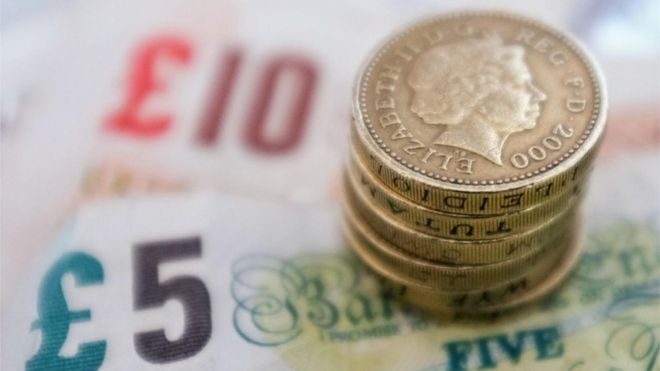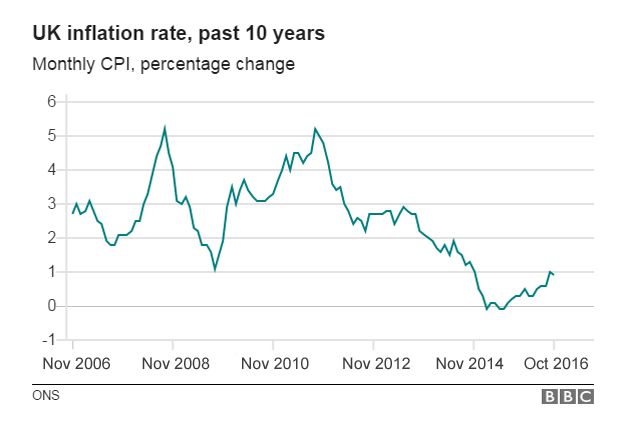
UK inflation registered a surprise fall in October, although there were signs that the pressure on consumer prices is starting to build.
The Consumer Prices Index (CPI) slipped to 0.9%, from 1% in September, the Office for National Statistics said.
That was below the 1.1% predicted by economists, who said sterling's fall would push October's CPI higher.
However, the ONS said factory gate prices and the costs of raw materials rose much faster in October.
Goods leaving factories rose by 2.1%, faster than expected and the biggest increase since April 2012. And costs faced by producers for raw materials and oil showed a record monthly jump in October, up by 4.6%.

"After initially pushing up the prices of raw materials, the recent fall in the value of the pound is now starting to boost the price of goods leaving factories as well," ONS statistician Mike Prestwood said.
"However, aside from fuel, there is no clear evidence that these pressures have so far fed through to the prices in shops," he said.
But there is an expectation among economists that inflation is set to rise, fuelled by the fall in the value of sterling since the Brexit referendum in June, which has pushed up the cost of imports.
On Tuesday, Bank of England governor Mark Carney told the Treasury Committee that "the thinking now is that inflation is going to go above target... We see more inflation coming through in 2017-18, and then a tail in 2019."
Inflation has been below the Bank's 2% target for nearly three years. Last year it was zero, the lowest since comparable records began in 1950.
Interest rates
The pound has fallen about 16% against the dollar and about 11% against the euro since June.
Chris Williamson, chief economist at IHS Markit said that despite October's CPI fall, the trend over the coming months would be upwards as rising factory costs feed through to consumers.
"It's therefore likely to be only a matter of time before price hikes in retailers' supply chains start feeding through to the customer, as retailers seek to protect margins," he said.
"The concern is that consumers are driving the economy at the moment, and higher inflation is starting to eat into people's spending power, subduing consumer spending."
And Nick Dixon, investment director at Aegon, said the trajectory for interest rates was also upwards.
"While slowing price growth may have come as a surprise to the markets, the days of low interest rates are numbered," he said.
"We're likely to see hawkish calls intensify among Bank of England officials in coming months. Despite the sluggish pace of inflation, the next 12 months are likely to see interest rates rise faster and higher than expected."
Earlier this month, the Bank of England forecast that inflation would rise to about 2.7% by this time next year.
The Retail Prices Index (RPI) - a separate measure of inflation, which includes housing costs - was 2% in October, unchanged from September, the ONS said.
Earlier this month, the ONS announced that from March 2017, there would be a new measure of inflation that would include the cost of owning a home.
No comments:
Post a Comment